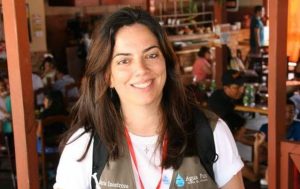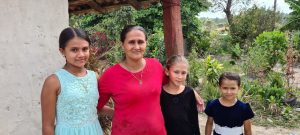 We are honored to announce that, thanks to generous funding from FIT (Fund for Innovation and Transformation), we’ll collaborate with CAWST (Centre for Affordable Water and Sanitation Technology) on testing innovative teaching methods to build awareness and change behavior around menstrual health and hygiene in Honduras.
We are honored to announce that, thanks to generous funding from FIT (Fund for Innovation and Transformation), we’ll collaborate with CAWST (Centre for Affordable Water and Sanitation Technology) on testing innovative teaching methods to build awareness and change behavior around menstrual health and hygiene in Honduras.
The Fund for Innovation and Transformation is a program of the Inter-Council Network (ICN) made possible through funding from Global Affairs Canada and administered by the Manitoba Council for International Cooperation (MCIC) on behalf of the ICN.
FIT: “Testing innovative solutions to advance gender equality in the Global South.”
Creating Safe Spaces for Learning:
My Body, My Health, and My Future
M3 Virtual Platform
 Written by Maria Regina Inestroza, PWW Country Director, Honduras
Written by Maria Regina Inestroza, PWW Country Director, Honduras
The idea for this project came about after realizing the difficulties and challenges that I was having during the first 3 months of the COVID-19 pandemic, when, due to the lockdown, myself and other women in our capital city of Tegucigalpa, had no place to purchase sanitary pads, as businesses where closed. Only people with health issues were allowed to circulate and enter pharmacies. The government forgot that, even with a pandemic, our periods don’t stop and having sanitary pads and the education to manage our menstruation is a human right.
“I was worried that my last 4 sanitary pads were not going to be enough to manage my own period.”
 I was facing the same difficulties that the girls in different parts of Honduras (and the world), have to deal with in their day-to-day lives, though not due to a pandemic but to the lack of resources, lack of places at which to purchase them in the rural areas, and a general embarrassment.
I was facing the same difficulties that the girls in different parts of Honduras (and the world), have to deal with in their day-to-day lives, though not due to a pandemic but to the lack of resources, lack of places at which to purchase them in the rural areas, and a general embarrassment.
The COVID-19 pandemic forced the closure of schools across Honduras, slowing Pure Water for the World (PWW) efforts to disseminate accurate knowledge about menstrual hygiene health (MHH) to support reducing existing stigmas and taboos.
Students currently complete all schoolwork from their homes, returning to the school monthly to submit assignments and collect new ones. Many students are becoming increasingly comfortable using online learning and communication platforms and tools, while internet access and ownership of mobile devices are increasing. PWW recognized the shift to virtual socializing and learning and the growing access to, and acceptance of, these platforms. This presented an opportunity to test a virtual learning platform, drawing on behavior change principles, to increase knowledge and change attitudes and norms around MHH in Trojes, a remote region where PWW has worked for more than 10 years.
To address the current barriers to MHH education, we proposed testing an innovative virtual learning platform. This platform is designed with a vision of changing menstrual health and hygiene behaviors. It aims to change attitudes and practices related to MHH and influence the social norms that prevent good MHH practice in Trojes. PWW has worked collaboratively with teachers at local schools in Trojes for over ten years; this innovative solution was designed in consultation with, and in response to, the challenges presented by women, girls and teachers, including their input and feedback.
The program will consist of a series of interactive learning modules and activities for girls and boys between the ages of 9 and 16, as well as other community members, in response to their specific needs, priorities, and interests. The lessons will be uploaded to RACHEL (Remote Area Community Hotspot for Education and Learning) servers, which host offline free educational content that can be accessed by computers, tablets, cellphones, and other electronic devices without requiring an Internet connection. The learning platform will be complemented by distribution of materials to make sanitary pads, and community sensitization activities.
Following the Behavior Centered Design process, formative research will be conducted to explore context-specific factors that influence MHH behaviors and practices, including perceptions of norms, ability factors, motives, routines, infrastructure and tools. In behavior centered design, research is conducted to identify key behavioral determinants and motives, and then campaigns (including education materials) are designed to leverage these determinants, and are known to initiate change more effectively than existing approaches to MHH education. Findings from this research will be used to develop appropriate e-Learning modules and activities about MHH that leverage these local priorities, needs, and interests to increase knowledge and change attitudes.
This project is a collaboration between Center of Affordable Water Sanitation Technologies ( CAWST) and PWW, with input from specialist consultants in formative research from Upward Spiral.
The funding is part of a unique Canadian initiative, the Fund for Innovation and Transformation (FIT), that supports ideas at the testing phase. Launched in May 2019, FIT funds Canadian small and medium-sized organizations from different sectors to test new or improved practices, policies and approaches with local partners around the world.



Project: Creating Safe Spaces for Learning: My Body, My Health, and My Future (M3 virtual platform)
Testing Country: Honduras
Testing period: 15 months
Amount: $250,000
The Centre for Affordable Water and Sanitation Technology (CAWST) and Pure Water for the World Honduras will be testing an interactive learning platform to increase knowledge, shift attitudes and change behaviours around menstrual health and hygiene (MHH) in Trojes, Honduras. By delivering MHH programming that is not confined to traditional classroom settings, this virtual platform will put information and tools about MHH directly in the hands of students and other key community members in ways that are engaging and fun, making an otherwise uncomfortable topic accessible.
Read full press release with details about the FIT funding selection: click here.
